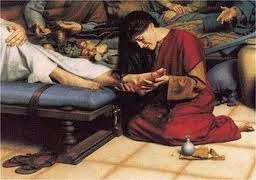MARY'S EXTRAVAGANCE
Mary is
oblivious to all around her, except for Jesus. She takes no thought for what
others would think, but what would please her Lord.
In
the Gospel for today's mass, we find that as Jesus dines with His friends, Mary
does something which only love can do. She takes the most precious thing she
has and spends it all on Jesus. Her love is not calculated, but extravagant.
Mary's action is motivated by one thing, and one thing only, namely, her love
for Jesus and her gratitude for God's mercy. However, she does something a
Jewish woman would never do in public. She loosens her hair and anoints Jesus
with her own tears. It was customary for a woman on her wedding day to bind her
hair. For a married woman to loosen her hair in public was a sign of grave
immodesty. Mary is oblivious to all around her, except for Jesus. She takes no
thought for what others would think, but what would please her Lord. In
humility she stoops to anoint Jesus' feet and to dry them with her hair. How do
you and I anoint the Lord's feet and show Him our love and gratitude?
Mary's
anointing of Jesus was indeed an extravagance. Judas, a shrewd calculator of
monetary worth, estimated that the perfume could have been sold for three
hundred pieces of silver (perhaps ten months' wages, and incidentally ten times
more than Jesus was worth in his eyes). Jesus saw in Mary's impetuous act a
beautiful sign of love (Mk 14:6). Love
does not always correspond with cold logic, and there is room in religion for
deeds which spring more from the heart than from the intellect. It is true that
the perfume could have been sold for the benefit of the poor, but Jesus, who
took second place to no one in his concern for the poor, graciously accepted
Mary's extravagance.
The
protest of Judas was hypocritical, made from no concern for the poor, since his
hope was to have pocketed the price of the perfume for himself. Today in the
Church there has been a healthy renewal of concern for the poor, and in many
respects we all need such a renewal. And yet some, with sincerity never felt by
Judas, seem to be making of religion nothing but the service of the poor. No
excuse should be manufactured for hoarded or abused wealth on the part of
anyone in the Church; however, there is much more to religion than the
alleviation of poverty, important as it is. Mary had learned that Jesus is the
resurrection and the life, and her act was one of loving recognition. The wish
to spend the money on the poor involved a lack of recognition of real nature of
Jesus as the Son of God. There must always be a time and place for service of
the poor, but there must also be a time and place for the due worship of the
person of the Son of God.
Let
us we examine our hearts correctly when it comes to serving those in need of
our support and the due worship to our Lord.
